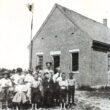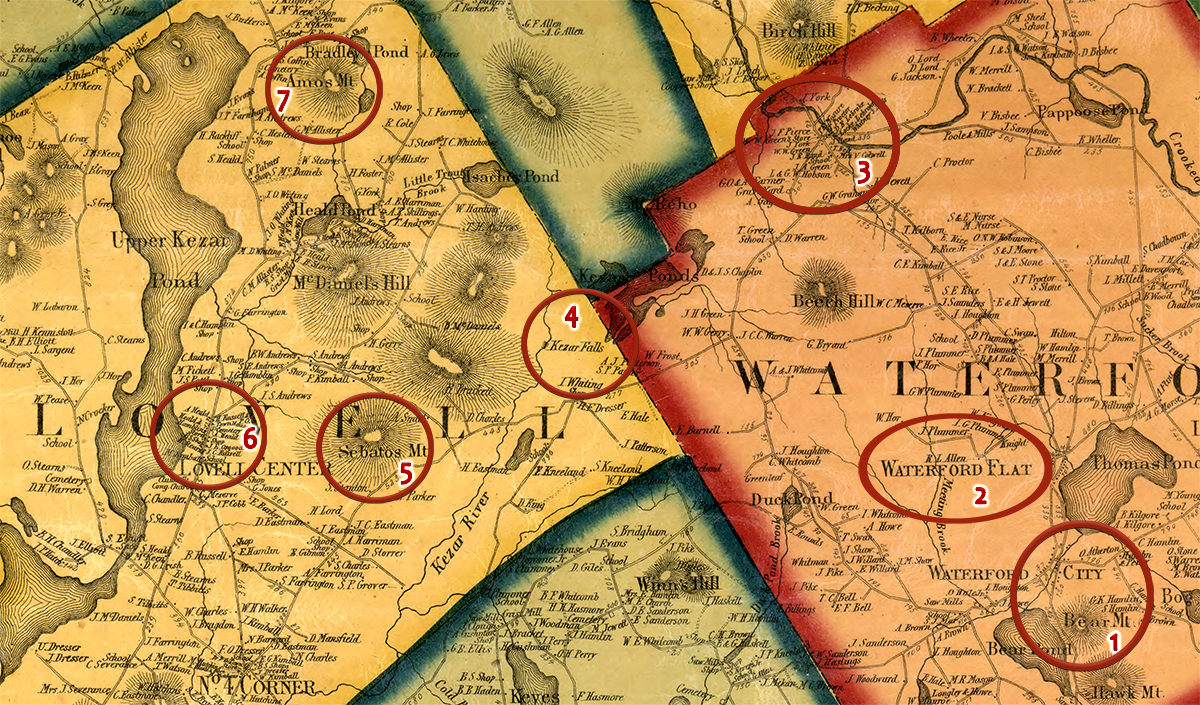From the Bridgton News, 07 Nov 1873
Transcribed by Janet Mahannah (Sweden Historical Society and GLLT). Paragraph breaks added for readability.
In 1873, a group left North Bridgton for an autumn trek across Waterford and Lovell just north of Sweden. One of their objectives was to meet up with ‘Uncle Amos’ and his Mountain in Lovell. Read about their journey. The map is keyed to locations mentioned in the text.

All the world knows it to be the fashion now-a-days to go to the mountains. So, getting infected with the prevalent mania, and circumstances preventing our doing the regular routine, our party of four started one morning, recently, in search of some localities not laid down in the guide books. Our way lay through the quiet village of North Bridgton, and as we rode along the valley road and neared the picturesque scenery of Waterford, many were the exclamations of delight at the leafy beauties on either hand.
The maples had already laid aside their brilliant robes and betaken themselves to their slumbers, but the oaks and beeches were out holding a carnival, appearing to consider the tulip-like hues of their neighbors in bad taste. These were clad in more subdued colors, but we noticed many of the younger ones were no way reluctant to add the garnet tint to their attire. As we neared Bear Mountain, its sides were brilliant in the morning light, while feathery mists still clung to its summit, and the whole was mirrored in the lake below. (1)
On through the ‘City,’ with its busy mills, we follow the brook, stopping so often on its way to aid the hands of man, never losing its music, though often delayed in its course. (2) On to the picturesque scenery of the ‘Flat.’ (3) What more lovely spot for a summer sojourn than these places, nestled so comely among the hills, with here and there a home-nest clinging to their wooded sides. What charming irregularities, a village kaleidoscope brining out a varied picture.
No. Waterford (3) we find to be a thriving place, with a usual complement of stores, mills and other necessities usually found in such localities. And now, after due inquiries of a man we see hurrying to his dinner, we make an abrupt turn to the westward, and congratulate ourselves on the near proximity of Kezar Falls (and lunch) which are said to be two and a half miles ahead.
But ah’ how much longer are some miles than others. There had been a heavy rain, and the swampy road was full of holes filled with water, through which we blundered, over countless log bridges, which served no visible purpose, since the water was everywhere. After going on in a while in this way, we again inquired, and were told to go on till we passed the pond, which we saw on our right;
then go up a little hill, then down into a hollow, up again, along a level, ‘keep our eyes peeled’ and we should see a road to the right, which we were to take. We did all of this and presently the roar of the waters proclaimed the vicinity of the Falls. We turn to the right and find ourselves on the spot. We haste to alight from our carriage, and before disturbing our dinner basket hurry for a peep into the gorge, where [illeg] along the foaming waters. We hold our breath as we carefully step to the verge of the rock and gaze down the deep chasm into which the torrent makes its final plunge, perhaps forty feet, into the dark pool below. We were just getting ourselves into quite a sublime frenzy, when we were suddenly brought down by the voice of our Senior calling us to postpone sight seeing and come to lunch. I don’t think we quite got to that height again. A big rock served for our table; and we ate and drank and returned to the falls.(4)
These Falls are on Kezar River, near the outlet of Little Kezar ponds, in the town of Lovell. (Why are not these bodies of water always called lakes?) The water, after leaving the pond, comes dashing down in its mad gallop, over a rocky incline, for some distance, then gathering force, it makes a final plunge through a narrow gorge some forty feet into a dark, foaming pool below, then glides along into a placid lake. They are not generally known to tourists, and are more worthy of a visit than the many more noted places. We lingered long, gathered souvenirs of our visit, and departed.
Our Senior had been impressed to visit ‘Uncle Amos’ and his mountain, referred to in the News, some weeks since. Accordingly we continued a westerly course, over a very uninteresting road. A birch wood on each side prevented out looking out to the mountains and gave but small compensation. We thus passed over about four miles of almost unbroken solitude, when we came to a schoolhouse (we wondered where the scholars came from) and turning northerly, commenced to ascend a considerable elevation, know as Eastman’s Hill. Up, up, until at last we are at the summit, and have a grand panorama opened to our view.
Before us are the eternal hills. Range after range – ‘Alps on Alps arise.’ No created thing approaches them in majesty. How small are we before ‘their awful fronts sublime.’ We can scarcely turn our gaze from them to other objects.
On our right is Sabatus, (5) of itself but a pigmy when we look at Washington, Kiarsarge, Carter, and their lofty kindred. On the left, at some distance, we noticed quite a large sheet of water, and our Senior asked a boy what pond that was. His reply was: ‘No pond at all; that is Fryeburg overflowed.’ Rather dubious for a journey that way as we had anticipated. This road leads us by a fearfully steep hill, or succession of hills, down to Lovell Center, a neat, sunshiny village.(6) We noticed here a very fine residence, a large two story building, with a Mansard roof, and owned by Mr. Heald, and I was near saying, a still finer barn. We stopped to admire it, and enter it upon our note-book. Size—forty by one hundred feet; clapboarded and painted white, (Query, Why will so many in the country paint their buildings a glaring white, thereby outraging the laws of harmony?) granite underpinning, and incline of the same material to the door, and the structure surmounted with a cupola, on the top of which is a gilded ox. Here we accosted some men at work, as to whether such a person as ‘Uncle Amos’ lived hereabouts.
‘Are you any of his folks?’ ‘No, we are strangers.’
‘How do you know anything of him?’
‘O, we have heard of him, and have come to see him.’ ‘Well, you will find him a queer man.’
They told us he was a man without a family, and boarded with a relative a mile or two beyond. We proceeded to the house designated, were told he had left there in the morning to visit his mountain, and we should probably find him at a certain house in the immediate neighborhood, where we might find lodgings for the night, as we were too far from the village to avail ourselves of the hotel accommodation there. Night was fast gathering about us, when we turned aside through a winding road to seek this shelter. We were soon comfortable housed, but did not find the person we sought. He was still in advance. Passed a very pleasant and social evening with the family. They gave us some very interesting information respecting ‘Uncle Amos.’ He is now eighty-two years of age. Had purchased the mountain thirty years ago for sixty bushels of rye, he had cleared the whole southern slope, had walled in several fields, in one or two of which he had set out a large number of apple trees, which are now bearing fruit—last year sixty-five barrels of apples. But the great feature of the place is, that he has actually set out shade trees from the base to very nearly the top of the mountain, a distance of half a mile. He had also laid out a carriage road, which is in tolerably good condition. But let me speak of our ascent.(7)
Our host kindly volunteered to go with us, and soon after breakfast we started. After walking a short distance on the side of a hill, we presently struck into a wood road, which continued through to the foot of the mountain. From this point the ascent is gradual until we pass the orchard which has a very thrifty appearance. Our way is by a winding road, with maples on either side. As we look up we see them marking the path to the top. To the right and west of us are a double row to shelter the whole declivity from the westerly winds. As we near the top the way is more steep, and the trees less in size. Upon gaining the summit a grand view is spread before our vision. To the north and just below us lies North Lovell and the whole range of the Stoneham mountains is before us. To the west and south stretches Great Kezar Pond, eight or nine miles. While our Senior was examining a granite quarry near the summit, ourself and young ladies became absorbed in gathering some choice mosses which we found in profusion. We rambled about for awhile, and were half way down the mountain on our return, when one of the party called our attention to a person approaching from another direction.
‘The very man you wish to see, ‘Uncle Amos’ himself,’ said our host. An elderly man, tall, erect, with staff in hand, came briskly towards us. We made ourselves known, with the object of our visit. He at once entered into conversation. Said he was convinced years ago, that sooner or later the iron horse would open this region to the travelling public, and this mountain would become a place of resort.
He had carried these trees up the mountain, a dozen or so at a time, and set them out. One large field entirely surrounded with trees, and designed as a site for a dwelling, was one of his plans. With his own hands, chiefly, he had accomplished all that had been done here. He had fallen short of what he wished to carry out, but had provided for his pet scheme in such a manner as to make it probable that it yet might be accomplished by those who should come after him. We would gladly have stayed longer in his company, but had already tarried too long, and were therefore reluctantly compelled to bid him adieu, and wend our way downward. We were soon at the farm-house and not long in starting.
To our kind host and hostess we are under lasting obligations for the brief but pleasant sojourn with them. For thee, Amos Andrews, may the remainder of thy days be pleasant. Although thy cherished hopes may not have been realized in this world, in the other life, to which thou must shortly pass; where, according to thy belief, thou wilt enjoy these things to a greater extent. These trees will be in after years, more fitting monuments to thy memory than stately mansions or granite columns.
E.

